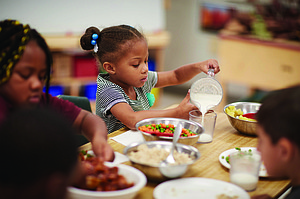1/17/2020

Many families look to the new year as a time to reset their eating habits and focus on making healthier choices. However, adults aren’t the only ones who could use a menu refresh as children may also need to focus on healthier food choices.
A study by the Centers for Disease Control and Prevention revealed children consume an unhealthy amount of added sugar every day. Researchers found nearly all of the toddlers in their study ate an average of 7 teaspoons of added sugar daily – the equivalent of a candy bar. Additionally, according to the American Academy of Pediatrics, excess sugar consumption can lead to an increased risk of obesity and type 2 diabetes.
“Small children have small stomachs,” said Courtney Hines, a nutritionist for KinderCare Learning Centers, which care for more than 165,000 children around the country every day. “You want them to fill up on nutrient-dense foods, not empty calories in the form of added sugar. When children consume lots of sugar, their palates get used to overly sweet flavors. They may not accept other, less sugary flavors or learn to appreciate the natural sweetness of a piece of fresh fruit.”
The American Academy of Pediatrics recommends against the consumption of added sugar for children under the age of 2. Children ages 2-18 should aim for less than 25 grams, or 6 teaspoons, of added sugar per day.
For families that want to cut down on the amount of added sugar in their diets, Hines recommends cooking more at home, relying less on processed, packaged foods and serving only water or milk for beverages.
Consider these low-sugar ideas for meal and snack times to help control the amount of added sugar you and your family consume.
Dip Smart
Herbs, spices, citrus and fresh fruit add flavor without relying on the added sugars found in many popular sauces and dips. Consider making your own low-sugar alternatives at home so your family can still enjoy favorite flavors like these:
• Ranch Dressing – In a bowl, combine mayonnaise, buttermilk, parsley, garlic powder, onion powder, salt and pepper for a kid-tested, nutritionist-approved take on a favorite dip. Serve over salad or as vegetable dip.
• Honey Mustard – Popular on a variety of sandwiches and as a dip or salad dressing, combining plain yogurt with milk, honey and regular or Dijon mustard can create a more family-friendly version.
• Teriyaki Sauce – Perfect for serving with healthier options like lo mein, chicken wraps or fried rice, a homemade version can be created using water, soy sauce, honey, ginger, garlic powder and cornstarch slurry.
Swap Out Syrup
Pancakes are a popular breakfast option at KinderCare centers and in many homes, but even the healthiest whole-grain pancake becomes a plateful of sugar if it’s doused in syrup. Hines recommends these toppings that are sweet and savory without the added sugar:
• Nut butter or seed butter (such as peanut, almond or sun) and banana slices
• Warm fruit compote (mix of warmed berries)
• Applesauce (no-sugar-added variety) and cinnamon
• Nut butter swirled into plain yogurt; mix in 1-2 teaspoons vanilla extract to add a sweet flavor
Snack Sweet
Opting for less added sugar doesn’t mean avoiding sweet snacks altogether. These alternatives can still help satisfy those cravings:
• Applesauce with baked cinnamon pita triangles for dipping
• Toast topped with nut or seed butter, smashed banana and sprinkle of cinnamon
• Frozen fruit smoothies
• Plain yogurt topped with granola, nuts, seeds or fruit
• Apple slices with nut or seed butter
For more ideas to introduce your children to healthy habits from a young age, visit kindercare.com.
